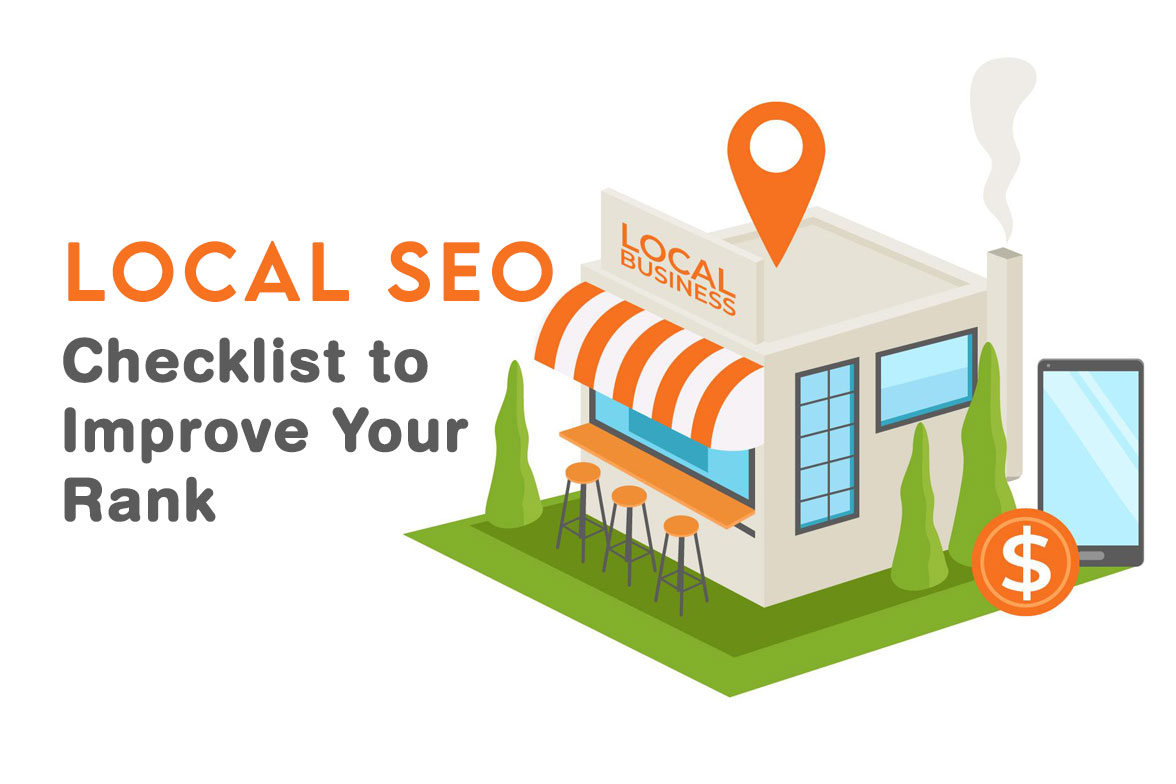Local SEO is no longer a new concept, but the importance of it continues to grow exponentially. Every day around one-third of people perform an online search for local businesses, and nearly half of all Google searches are related to regional information.
Here are some facts about local SEO:
- An incredible 70% of website traffic is driven from local and organic sources, highlighting just how influential these web connections are in reaching a broad range of audiences.
- Nearly 80% of people who look up businesses on their smartphones end up going to that business in person.
- Consumers are 28% more likely to purchase items if they have conducted a local search beforehand.
If you don’t have a strong local SEO strategy, then you’re not reaching all the potential customers who might be interested in your business.
Below are the 13 important SEO checklist tasks to consider.
- Mobile Friendly website
- SEO friendly URLs
- Fast website speed
- Proper internal links
- Structured data
- Optimize title tags & Meta description
- Keyword rich blogs
- Local Keywords on website
- Optimize Google Business Profile
- Get reviews
- Local backlinks
- Social media stratergy
- Consistent local listings
Create a strong foundation for your business through an effective website.
If you want to achieve successful local SEO, you must have a strong foundation. Your website is the most essential factor in this; if it doesn’t follow best practices for search engine optimization, no amount of optimization will help your business reach its goals. A quality website should be one of your top priorities when striving towards optimizing locally!
- Fast page speed: Page speed is an essential factor to consider when optimizing for search engine rankings, as users will quickly abandon a page if it takes too long to load.
- Mobile-friendly Website: Google prioritizes the mobile version of your website over its desktop counterpart, making this a necessity for local SEO.
- The right URL structure: No matter who visits your website, how it is structured matters. To ensure a smooth and effective user experience for both humans and search engines alike, make sure to build an organized site with an obvious pathway from landing page until conversion.
- Internal Links: If you want people to be able to find information on your website easily, link the pages of your website that are related to each other. This will help Google and other searchers find the information they need.
Use structured data
Structured data, or Schema markup as it’s often called, is a code you can put into the back end of your website. This helps search engines comprehend and classify your content so that Google can offer more accurate results in their searches. With Local Business structured data specifically, you have access to a wide array of features such as business hours, services offered for customers, reviews from past consumers and much more – all with the goal of improving your presence in local web searches! This will greatly enhance the visibility of your business and make it easier for customers to find what they need quickly.
Identify and incorporate local keywords
To rank higher in local searches, it’s essential to understand the types of queries your business should strive for. The simplest solution? Conducting a comprehensive analysis of relevant keywords.
Keywords are terms or phrases people use when trying to find something on search engines – by targeting particular words as part of your localized SEO strategy, you can significantly increase your visibility during searches. Your selection needs to be related directly with what you offer and where you’re located so that potential customers from nearby regions will notice it too!
Optimize title tags and meta descriptions
Now that your website is well-maintained and you have a solid local keyword list, it’s time to start optimizing for local searches. A great way to do this is by refining the title tags and meta descriptions of each web page. Title tags are HTML elements indicating the page’s title – they will be visible in search engine results pages (SERPs). Make sure those titles contain relevant keywords to drive traffic from potential customers near you!
Consider a blog (or an FAQ page)
Google wants to know if the information on your website will help people. EAT stands for Expertise, authoritativeness and trustworthiness. This is what Google uses to decide if your website is good. Having a blog can help with all of these things. You can show that you know what you are talking about and that you are credible. This will help people trust your website more.
You can maximize the content you create for your website by using it to promote your business on social media, newsletters, and even more detailed downloadable materials in order to capture web visitors’ contact information. If you’re already running a blog for your company, make sure that the posts are keyword-specific too! By doing this, not only will search engines be able to find them easier but also readers will gain valuable insight into what products or services you offer. Don’t have a blog yet for your business? That’s no problem! You can begin one today by doing some keyword research, utilizing tools like Google Trends to see what people are looking for online, and inquiring from your customers about the content they’d love to find on it. With this information in hand, you can start crafting amazing blog posts now!
Don’t think that you lack the capacity to run a successful business blog? An FAQ page is an excellent way to generate thorough and keyword-driven content without taking up too much of your time. Not only will this aid in improving your ranking on search engines, but it also provides potential customers with helpful information regarding their inquiries – ensuring them that they’re making the right decision by choosing you!
Claim and optimize your Google Business Profile
With a Google Business Profile, you can be easily discovered amongst local searches taking place on both Google Search and Maps. The sleek profile contains an abundance of information that makes it easier for customers to take immediate action from your page – often appearing as the first set of results below advertisements when performing any nearby search. A well optimized google business profile is instrumental in helping boost visibility within the digital landscape!
The first step is to make sure you have a Google Business Profile. You can do this from Google Search!
Don’t forget to verify your Google Business Profile after claiming or adding it, since this will allow you make changes as desired. After being claimed, optimizing your listing is feasible – don’t hesitate to take advantage of its various components for a boosting local SEO! It’s an integral step that should not be overlooked.
Tips to optimize Google Business Profiles for local SEO:
- Update all information: It is important that your business hours, website, phone number, and address are all correct. This information should be the same on all of your listings.
- Select Correct business category: When you are trying to improve your website’s ranking in search results, it is important to choose the right primary category. Many experts believe that this choice has the biggest impact on your local search rankings. You can always change it later if you need to.
- Update all available fields: SEO experts believe that the first category you choose is the most important for your local search rankings. So choose carefully!
- Uploaded Images and Videos: Google encourages you to upload a plethora of visuals, such as your logo, cover photo, interior and exterior shots of the building that houses your business, team photos, along with outdoor activity images showcasing how hardworking your staff is.
Manage reviews
Reviews are vital ranking factors in local SEO and should not be overlooked. Studies show that almost 90% of people read reviews before purchasing from a business, so it’s clear what the public wants – Reviews!
Google considers your reviews when determining your positioning for certain searches; they also observe specific keywords or phrases within the review content, which could positively or negatively affect local search results. Higher star rating can be advantageous in local search – when someone looks up keywords associated with “best,” then Google will only present companies that have at least 4.0 stars or more!
How to get reviews:
- You can ask your happy customers to leave you feedback.
- You can put a link to your Google Business Profile in customer emails. This will help people find your business more easily.
- You can send a survey to people by email.
- Sending WhatsApp feedback notification.
Keep in mind to respond to reviews.
Make sure that all of your local listings have the same information. (NAP)
For local SEO success, establishing an online presence on reliable local listings is essential. These sites not only serve as a gateway to potential customers in the area, but they can also be seen on search engines and apps. Investing time into updating your business’s information across these platforms will help you get discovered and reach more clients than ever before!
Nonetheless, it is even more vital that your business information across all of these sites is uniform. Search engines strive to ensure that they are displaying the most accurate and beneficial data for searchers. By making use of signals from around the web — if they observe that each indispensable piece of info about your company (including Name, Address, and Phone Number – referred to as NAP) is consistent – then search engines can have a substantial level of trust in conveying correct details.
Nevertheless, if they find any conflicting data or inconsistencies in your business’s information, their trust level may lessen and it could result in them not displaying your company on the first page of search results. Thus, adding local listing consistency to your Local SEO plan is crucial for you to succeed. You should ensure that everywhere – from Google Businesses to Yelp and CitySearch among others – has an exact duplicate of your business name, address as well as phone number for optimal visibility!
Use Social Media business profiles
On websites such as Instagram and Facebook, you have the chance to include exact details about your business – making these channels work like mini listing sites! Additionally, when users share content from other webpages featuring information about your company or product on their own networks, this can lead to an increase in website traffic and visibility online.
By managing your presence across various social media sites like Facebook, Instagram, Twitter and LinkedIn, you can take up more space on the search engine result pages when someone looks for your business. This results in increased visibility and recognition of your brand name among users who are searching for it.
Build local backlinks for business
Link building is still a good way to improve your website’s ranking on search engines. When other local websites link to your site, it tells search engines that your site is trustworthy and authoritative, which can help boost your rankings.
Ways to build Local backlinks:
- Built local Listing
- Guest posting
- sponsor local events
- local digital press release
Local SEO is a critical component to any business’s success. By leveraging the power of local listings, social media profiles and backlinks, you can ensure that your audience will more easily find your business when they search for it online. We hope this Local SEO Checklist has provided some helpful tips on how to make sure all of your information is consistent across platforms and what steps you should take in order to increase visibility for your brand. With these strategies in place, you’ll be well on your way to generating leads from organic search engine results!





